Quantitative Hyperbolicity Estimates in One-Dimensional Dynamics
This page contains additional information and data referred to
in the paper Quantitative hyperbolicity estimates
in one-dimensional dynamics
by Sarah Day,
Hiroshi Kokubu,
Stefano Luzzatto,
Konstantin Mischaikow,
Hiroe Oka,
and Paweł Pilarczyk
A preprint of this paper can be downloaded
here: [ PDF ]
[ PS ]
Files for Download
Below is a list of files for download
(please, see the description in the next sections).
The zipped files should be uncompressed to empty subdirectories (folders),
except for capd-capdDynSys-4.2.153.zip, which already includes a subfolder.
Please, note that in Windows these files should be unzipped
in the text mode to ensure the correct conversion
of line endings (add the -a command-line switch
in case of unzipping with the Info-ZIP software).
Note that all the files listed above may have been recently updated.
Here are the original files that were published
at the time of publication of the paper that are different from those listed above:
Software
The software for computations described in the paper
is written in the C++ programming language for optimal
effectiveness and flexibility.
Detailed documentation of the software
has been prepared with Doxygen.
Feel free to browse this documentation
and learn about the details of how the software was programmed.
The file unifexp-dox.zip
contains the compressed version of this documentation which
is available here for easy download for off-line browsing;
please, unzip the contents of the archive into an empty directory,
and open the file index.html.
The file unifexp-src.zip
containing the source code of the software
is available here for download under the terms
of the GNU
General Public License.
It is prepared for the compilation with the GNU C++ compiler,
either in GNU/Linux (or a similar system),
or in Windows in the MSYS environment.
A relatively recent version of the compiler is required
to compile the code correctly.
The provided makefile must be adjusted before the compilation,
especially as far as the paths to the CAPD and CHomoP libraries are concerned
(please, see the explanations in the file itself).
The software uses the Boost,
CHomP
and CAPD libraries
which are publically available,
the last two under the terms of the GNU General Public License.
Please, refer to the websites of those libraries
for the source code and compilation instructions.
Note that the Boost library is often included in standard
GNU/Linux distributions, so no installation might be necessary.
This is not the case with the other libraries, though.
Even worse, since those libraries are undergoing dynamic development,
it may turn out that their interface may slightly change
in the future versions, so a copy of compatible versions of both libraries
is available for download from this page
(please, see the previous section).
Compilation of the Software
Step 1. Compilation of CHomP.
This is my suggestion:
- mkdir chomp
- cd chomp
- unzip -a ../chomp-lib.zip
- make library
- cd ..
Please, see the
CHomP
website for more information on the compilation of this software package.
Step 2. Compilation of CAPD. Since this library has many options,
here is my suggestion for how to compile it.
Note that it may be necessary to install
the additional package pkg-config
if it is not present in the system.
- unzip -a capd-capdDynSys-4.2.153.zip
- mkdir capd4
- mkdir capd4_compil
- cd capd4_compil
- ../capd-capdDynSys-4.2.153/configure
--prefix /home/your-dir/capd4
--with-filib=yes --with-mpfr=no --with-boost=/usr --without-gui
- make
- make install
Please, see the
CAPD website
for more information on the compilation of this software package.
Step 3. Compilation of the unifexp program.
After having successfully compiled the CHomP and CAPD libraries,
this is my suggestion how to proceed:
- mkdir unifexp
- cd unifexp
- unzip -a ../unifexp-src.zip
- make
Step 4. Testing the program.
You can run a test computation to see if the program works:
- ./unifexp -p uniform -i --rigorous -k5001 -a1.83139961 -a1.83139961
--lambda --delta -L0 -L0 -f a00.dat --log a00.log --debug
Remark. It seems that the program unifexp
does not compile with gcc 4.4.6 20120305 (Red Hat 4.4.6-4)
due to a problem with the power function in CAPD.
The same with gcc (Debian 4.4.5-8) 4.4.5.
If you encounter this kind of a problem, please,
try using a more recent version of the GCC compiler.
Remark for Mac users.
I tested this software on a Mac with OS X El Capitan Version 10.11.6
and GNU C++ compiler 7.2.0 provided by
MacPorts.
For compiling the CHomP library, I used the command
While compiling the CAPD library, I modified the
configure command to
- export CC=gcc-mp-7 -m64
- export CXX=g++-mp-7 -m64
- ../capd-capdDynSys-4.2.153/configure --prefix /Users/pawel.pilarczyk/capd4
--with-filib=yes --with-mpfr=no --with-boost=/usr --without-gui CXX="g++-mp-7 -m64"
CC="gcc-mp-7 -m64" CXXFLAGS="-O2 -Wall"
I also compiled the
unifexp program with the command
Please, adjust these settings to match your specific system.
Results of Computations
The raw data with the results of computations used to create
the figures published in the paper, and also with some other
results, can be downloaded below. All these results
were produced by the software described in the previous section
and are encoded in text files whose lines contain
the following items as a space-separated list:
- the asterisk that indicates the beginning of a data set
(comments are preceded with the semicolon)
- the identifier of the data piece in the format level:number
(e.g., 4:12)
- the left end of the parameter interval (minimal parameter value)
- the right end of the parameter interval (maximal parameter value)
- the total number of intervals that cover both Δ
and the remainder of I
- the diameter δ of the critical neighborhood
- the computed expansion exponent λ
- the computed value of log C (0 if not computed)
- the computed value of λ0 (0 if not computed)
- the computation time measured in seconds
The raw data is contained in files named
a01.dat,
a02.dat, etc., which are together compressed in the single file
unifexp-dat.zip for easy download.
Brief descriptions of the computations are available below together with
some PDF files with figures produced from this data
with
gnuplot.
All the computations were conducted with the switches
-i
and
--rigorous of the program to ensure rigorous computations
with interval arithmetic, and also taking entire (sub)intervals
of
a where
a was varying, with the exception for a few
series of computations marked as
non-rigorous. The range of each
variable (
delta,
K, or
a) which was changing
in each series of computations was divided into 4096 almost equal parts.
In case of
delta and
K, almost equally spaced single values
were take for each computation. In case of
a,
entire intervals were taken in order to ensure
complete coverage of the interval [1.7,2].
| specifications |
graphs |
a01.dat
K=5000
delta: 0.005-0.5
a=2.0 |
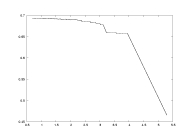
lambda as a function of
-log(delta) |
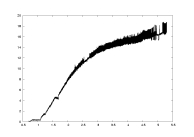
computation time
as a function of -log(delta) |
a02.dat
K: 100-7900
delta=0.01
a=2.0
Floyd-Warshall |
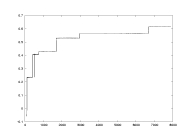
lambda as a function of K |
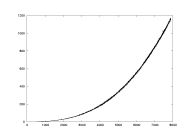
computation time
as a function of K |
a03.dat
K: 100-7900
delta=0.01
a=2.0
Johnson |
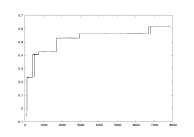
lambda as a function of K |
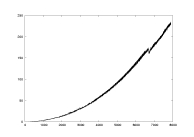
computation time
as a function of K |
a04.dat
K: 100-7900
delta=0.01
a=2.0
critical partition |
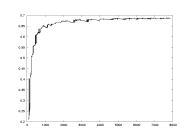
lambda as a function of K |
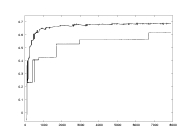
comparison of lambda computed with critical vs. uniform partition |
a05.dat
K=5000
delta=0.1
a: 1.7-2.0
critical partition |
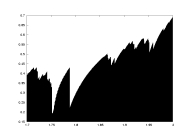
lambda as a function of a |
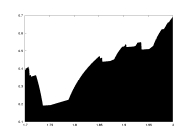
lambda0 as a function of a |
a06.dat
K=5000
delta=0.1
a: 1.7-2.0
uniform partition |
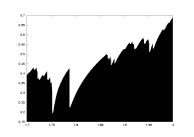
lambda as a function of a |
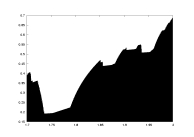
lambda0 as a function of a |
a07.dat
K=5000
delta=0.1
a: 1.7-2.0
derivative partition |
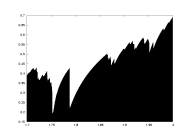
lambda as a function of a |
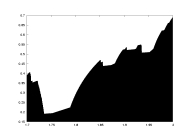
lambda0 as a function of a |
a08.dat
K=5000
delta=0.001
a: 1.7-2.0 |
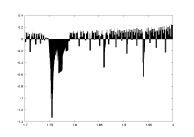
lambda as a function of a |
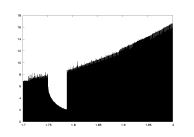
computation time as a function of a |
a09.dat
K=5000
delta=0.01
a: 1.7-2.0 |
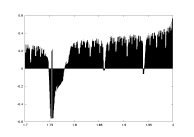
lambda as a function of a |
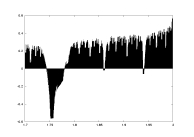
lambda0 as a function of a |
a10.dat
K=5000
delta min
lambda>0
a: 1.7-2.0 |
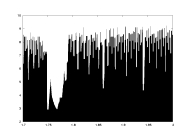
-log(delta) as a function of a |
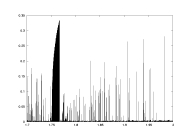
lambda as a function of a |
a11.dat
K=5000
delta min
lambda>0.1
a: 1.7-2.0 |
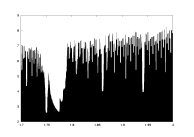
-log(delta) as a function of a |
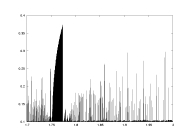
lambda as a function of a |
a12.dat
K=5000
delta min
lambda0>0
a: 1.7-2.0 |
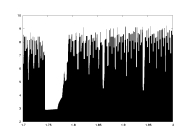
-log(delta) as a function of a |
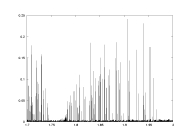
lambda0 as a function of a |
a13.dat
K=5000
delta min
lambda0>0.1
a: 1.7-2.0 |
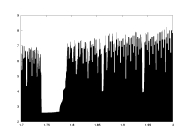
-log(delta) as a function of a |
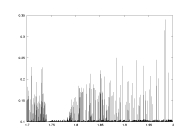
lambda0 as a function of a |
a14.dat
K: 100-7900
delta=0.01
a=2.0
(computing
lambda only) |
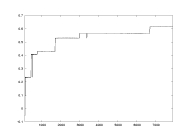
lambda as a function of K |
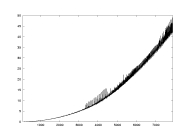
computation time
as a function of K |
a15.dat
K=5000
delta=0.01
a: -2.0-2.0
cubic map
non-rigorous |
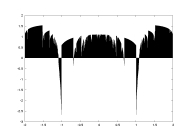
lambda as a function of a |
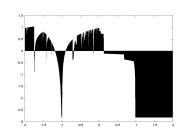
lambda0 as a function of a |
a16.dat
K=5000
delta=0.05
a: 0.67-1.0
unimodal map
with gamma=1.5
non-rigorous |
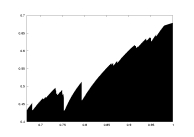
lambda as a function of a |
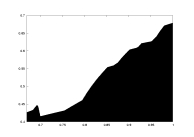
lambda0 as a function of a |
a17.dat
K=5000
delta=0.05
a: 0.9-1.0
unimodal map
with gamma=2.5
non-rigorous |
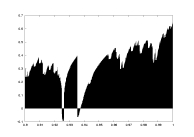
lambda as a function of a |
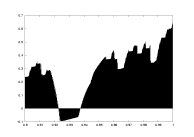
lambda0 as a function of a |
a18.dat
K=4000
delta=0.02
a: 1.5-2.0 |
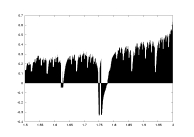
lambda as a function of a |
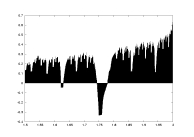
lambda0 as a function of a |
a19.dat
K: 100-7900
delta=0.01
a=2.0
derivative partition |
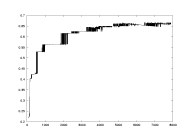
lambda as a function of K |
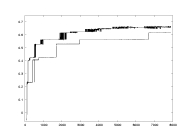
comparison of lambda computed with derivative vs. uniform partition |
The figures in the paper were generated using the following data:
- Figure 3 - a01.dat
- Figure 4 - a02.dat
- Figure 5 - a02.dat and a04.dat
- Figure 6 - a02.dat and a03.dat
- Figure 7 - a10.dat
- Figure 8 - a09.dat
- Figure 9 - a10.dat





































